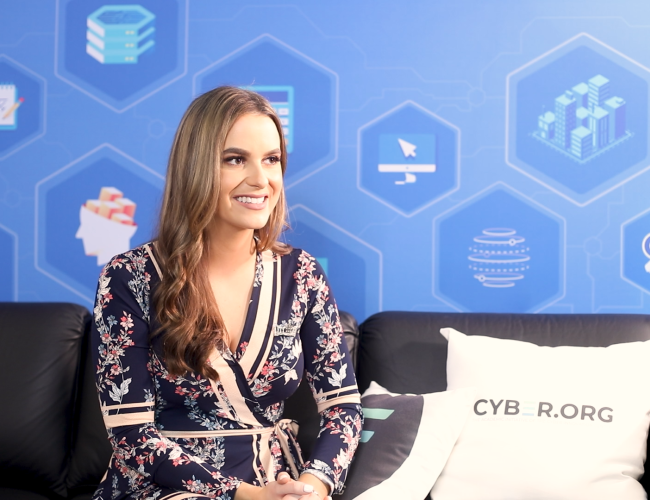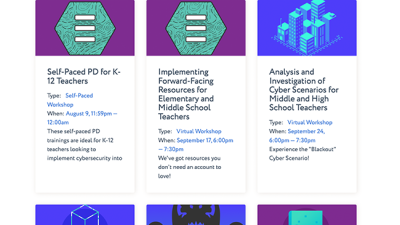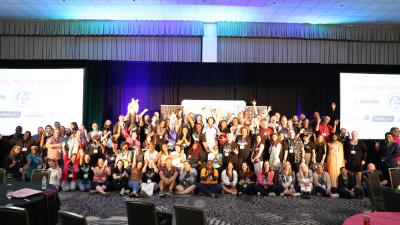Charlene: We're excited to talk with Camille Schreier. Miss America 2020. Camilla is a woman of science and she amazed young women around the world when she demonstrated a really cool science experiment as her talent. We thought we'd do a lightning round of questions to get to know you a little better.
Should Pluto be a planet? Yes or no?
Camille: I think so.
Charlene: Chemistry or biology?
Camille: Biology
Charlene: Anions or cations?
Camille: Cations.
Charlene: What's your favorite molecule?
Camille: Hydrogen peroxide.
Charlene: What's your favorite science experiment?
Camille: The catalytic decomposition of hydrogen peroxide. I'm a little biased on that one. (watch Camille's experiment here)
Charlene: Nice. If you could have lunch with one scientist past or present, who would it be?
Camille: Jennifer Doudna and Emmanuelle Charpentier, who are the two scientists that just won the Nobel Prize in Chemistry. They're the first two females to ever win that prize together.
Charlene: You have a whole day off from being Miss America. What do you do?
Camille: I usually like to spend time cooking. That's one of the things that I that I learned made me love chemistry, something I enjoy doing and then spending time with my dog.
Charlene: What is one of your favorite things to cook?
Camille: Pizza. And I think it's because I love yeasted doughs, which has to do with biology.
Charlene: We were excited to watch you break stereotypes of what a typical scientist is. And we'd like to know a little bit more about the things that you're passionate about. You made headlines during the Miss America 2020 competition for conducting a science experiment on stage. Can you tell us a little bit more about that experience?
Camille: Yes. And it's really interesting because I have a background in STEM, it was something I always loved. And that was what I majored in, in college, I did biochemistry and systems biology. And when I decided to compete for Miss America, I had a problem to solve, which was I didn't do a traditional performing talent. I wasn't a singer, I wasn't a dancer, I don't play an instrument. I can't twirl a baton or do any of those traditional Miss America performances. But as a woman of science, it was interesting for me because I saw it as an opportunity to solve a problem with critical thinking. And I decided to do something that was not only true to who I was, but was able to demonstrate my talents in STEM. And so I chose a chemistry demonstration very intentionally because it was so visual, and it was engaging for an audience because it is a performance. And it had to be entertaining. And so I did elephant's toothpaste, which was easy to make very large and very colorful. And it ultimately led to my success in winning Miss America.
Charlene: As a former STEM educator, I love that you showed science as your strength and your talent.
Camille: Thank you.
Charlene: What inspired you to incorporate stem into your experience in the pageants?
Camille: To allow young women and men across the country to normalize successful feminine women in STEM, we've made a lot of progress in having equality and representation of women in STEM. But there's still this idea that women who are in STEM careers aren't inherently feminine. And to normalize the science princess is kind of what I've become that you can do both you can love being a princess and for those little girls who want to be a princess and see my crown and get very excited to see that you can do both you can be that person but you can also love STEM and be a really successful scientist, as an adult that those things are not mutually exclusive has been part of my mission.
Charlene: I think that's a great message on being true to your authentic self.
Camille: Absolutely. I think that being true to my authentic self is exactly what my overall message throughout my entire year as Miss America has been. And part of the reason why I really ultimately became Miss America this year.
Charlene: At what point in your education did you decide to pursue STEM as a career?
Camille: I can't think of a time that I didn't have a STEM career as my ultimate career goal. It was always part of the plan for me. But it's interesting when I talk about STEM careers, because I often had many different ideas of what I wanted to do in STEM. And that changed many times throughout my education. And that was okay. And it's very important to understand for students, how many opportunities exist in STEM, even if you just think of science, technology, engineering and math, choosing potentially one of those fields, and then there's many subfields of those, there are so many opportunities. And figuring out what STEM career is right for you is sometimes a process of trying things and figuring out where you like something or maybe where your passions are. And then eventually I landed on biochemistry and systems biology and now I'm a doctor of pharmacy student.
Charlene: Wow. How has integrating STEM and the Miss America platform furtherd your goal of creating a more inclusive industry?
Camille: It's given me the opportunity to really rewrite the script of what Miss America has looked like for very long, but then also show women in STEM careers, how important communication and presentation is. And quite honestly, in all STEM fields, if you're not able to effectively communicate, you're not going to be quite as successful as another person who has the same type of education and has the communication skills. And I think that that's been a really important thing to talk about. But also being able to be Miss America and now be able to be the scientist Miss America of 2020 has been an opportunity that has also furthered my own STEM career, because it's given me the opportunity to advocate and understand the issues within the science communities and in different pieces of STEM that I wasn't privy to just being a student in the classroom.
Charlene: Why is it important for everyone, especially students, to learn science?
Camille: More than anything, you learn problem solving and critical thinking in a way that you don't learn in a lot of other subjects in school. And so even if you don't want to pursue a career in STEM, understanding, science, technology, engineering, and math, and how to solve problems with those is a skill that's applicable in whatever career path a student wants to take.
Charlene: What would you tell a student who is considering pursuing a stem degree or career?
Camille: I would tell them that it's not going to be easy, but it will be worth it. Because I remember struggling in some of my classes, and thinking that I would never be successful in a STEM career because I didn't have an A in every single class or I did poorly on one particular test. And there were classes in college that I even had to repeat, because I struggled in them. But I graduated, and I was able to start my career and having those few bumps in the road, didn't mean that I wasn't going to be a successful STEM professional. And I think it's unrealistic for students to think that they will be perfect students in a STEM career. And to not let that demotivate them to focus on the passion for the subject, and push through those barriers that they do find. Because it will be worth it in the end. I like your attitude that you persevered, even when you didn't get the grade that you wanted. Absolutely
Charlene: And continue to try. How should students interested in STEM get involved clubs or competitions?
Camille: Any way that you can become more involved with STEM is a great way to start. I know that for me, I went to science camps when I was in school. And I participated in any STEM related extracurricular activities that I could. That's so important to not only continue the engagement with STEM, but figure out what piece of STEM a student is interested in. So I went to physics camps, I went to chemistry related programs, and I was able to try things, I was able to mentor people and learn from other scientists and figure out what really was of interest to me. And so I think that anything a student can do to get more exposure into STEM careers is very beneficial to their long term success.
Charlene: As a woman in STEM, have you had to overcome adversity?
Camille: Not as much as women prior to me, but I have had small incidents that kind of make me remember that sometimes, it's not always an equal playing field. And I think back to the most memorable moment of those, which was when I was in a 10th grade chemistry class. And my male teacher had, you know, I'd answered a question correctly in class. And he said to me, you know, even a blind squirrel gets a nut sometimes. Because I was always very, very open and participating in class. And I think that that's something I encourage students to do, because failure is part of learning. And even if you do get a question wrong, it's important to try and think that through and then figure out maybe why the correct answer is what it is. So I was always open to participating. But I remember that day. And I remember thinking in that moment, would he have said that to a male counterpart in my class, and I was one of only maybe three female students in that honors chemistry class. And I remember that. And I'm glad that that moment didn't ever dissuade me from continuing in chemistry and biology. But that's a very small piece compared to women that have come before me and really struggled in equality in their careers. And I've heard stories from women who are maybe in their 50s or 60s and went through formal education and research programs and struggled. And I'm really grateful to have had a wonderful experience as a woman in STEM with the exception of that one time.
Charlene: Yes. And your message is so important, not just for women, but for men, also, for them to realize how essential it is for them to encourage girls to pursue STEM.
Camille: Absolutely.
Charlene: Who's your role model?
Camille: Oh, that's hard. I think my mom is a role model for me, as most women would say. But she is a woman in STEM in her own right because she's a nurse. And she was able to take her STEM education as an RN and apply that into business, which is something that I'm hoping to do is taking my my stem background and potentially working in a pharmaceutical company in a very unique way. And I think that when we look at STEM careers, we shouldn't box ourself in just to STEM because stem has been applicable in so many different industries across the country, especially in business. And so seeing my mom take a very traditional career and then applying it in a new place that was very successful is something that I definitely admire, it takes creativity and perseverance.
Charlene: Thank you. We are so excited and inspired by your message, and especially how you break stereotypes for what a typical scientist is.
Camille: Thank you. I appreciate it. And thank you for everything that you are doing to help advance STEM education in K through 12 classrooms across the country. I really appreciate that.



